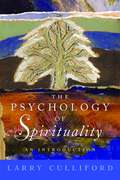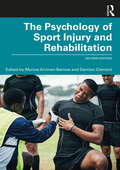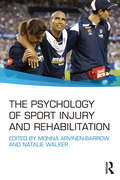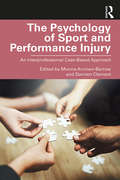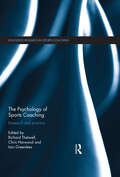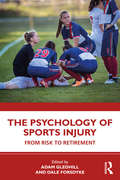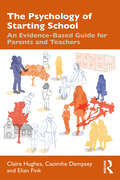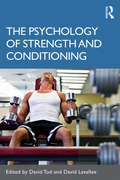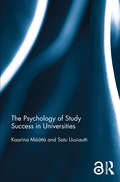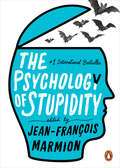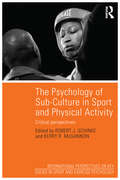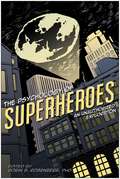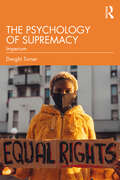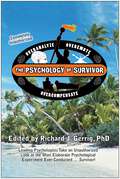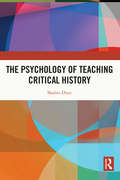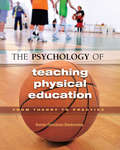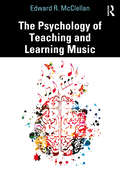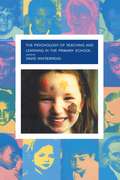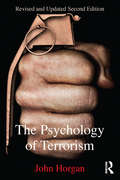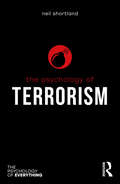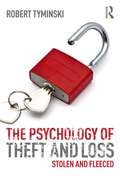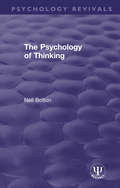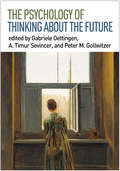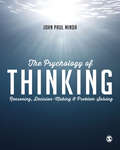- Table View
- List View
The Psychology of Spirituality: An Introduction
by Larry CullifordSpirituality is increasingly accepted as integral to human psychology, vital for physical and mental health. The Psychology of Spirituality is an accessible book that introduces the relationship between spirituality and psychology. The author sets out what spirituality is, the values it represents and how it can contribute to mental health and wellbeing. He then illustrates how knowledge of spirituality can provide a deeper understanding of peopleâ??s problems and can help them develop resilience and aid recovery. With reference to a new holistic or â??psycho-spiritualâ?? paradigm, the book then covers stages of spiritual development: from having natural spiritual awareness in early childhood to the waning of interest in later childhood; largely conforming to group mentality in adolescence before discovering individuality; and then the final journey towards full personal and emotional maturity. Finally, the author outlines practical advice on how to explore and make use of spirituality, covering a range of spiritual skills and practices, including meditation and contemplation. Each chapter includes case examples and exercises to explore the ideas covered. This book will be compelling reading for psychologists, psychiatrists, chaplains, healthcare professionals, students, and anyone wanting to understand better the role of spirituality and psychology in the lives of all.
The Psychology of Sport Injury and Rehabilitation
by Monna Arvinen-Barrow Damien ClementWritten by internationally known experts The Psychology of Sport Injury and Rehabilitation draws on the latest research in sport psychology and sports medicine. Using case studies to augment the reader’s experience, this new edition emphasizes the importance of a holistic, interprofessional approach to sport injury management and care. By doing so, the book provides injured individuals, their families, and healthcare professionals a thorough overview of how psychology plays a role in sport injury prevention, rehabilitation, and return to participation process. Athletes routinely use psychological skills and interventions for performance enhancement but, perhaps surprisingly, not always to assist in recovery from injury. This book demonstrates the ways in which athletes and practitioners can transfer psychological skills to an injury and rehabilitation setting to enhance recovery and the well-being of the athlete. Psychology of injury is an integral part of sport injury prevention, rehabilitation, and return to participation process. The second edition of The Psychology of Sport Injury and Rehabilitation is a comprehensive text grounded in biopsychosocial theory and scientific evidence. The fully revised second edition is an important resource for students, academic scholars, and applied practitioners working in sport psychology, sports medicine, sports coaching, and other related healthcare professions.
The Psychology of Sport Injury and Rehabilitation
by Monna Arvinen-Barrow Natalie WalkerAthletes routinely use psychological skills and interventions for performance enhancement but, perhaps surprisingly, not always to assist in recovery from injury. This book demonstrates the ways in which athletes and practitioners can transfer psychological skills to an injury and rehabilitation setting, to enhance recovery and the well-being of the athlete. Drawing on the very latest research in sport and exercise psychology, this book explores key psychological concepts relating to injury, explaining typical psychological responses to injury and psychological aspects of rehabilitation. Using case studies in every chapter to highlight the day-to-day reality of working with injured athletes, it introduces a series of practical interventions, skills and techniques, underpinned by an evidence-base, with a full explanation of how each might affect an athlete's recovery from injury. The Psychology of Sport Injury and Rehabilitation emphasises the importance of an holistic, multi-disciplinary approach to sports injury and rehabilitation. No other book examines the psychological aspects of both sports injury and the rehabilitation process, and therefore this is an essential resource for students, scholars and practitioners working in sport psychology, sports therapy, sports medicine or coaching.
The Psychology of Sport and Performance Injury: An Interprofessional Case-Based Approach
by Monna Arvinen-Barrow Damien ClementThe use of psychological interventions and counselling strategies has become a central part of injury prevention, rehabilitation, and return to participation process. The Psychology of Sport and Performance Injury: An Interprofessional Case-Based Approach is the first book to offer students, academic scholars, and practitioners case studies that are grounded in psychological theory and empirical evidence, with a specific focus on addressing psychological aspects of sport and performance injuries in an interprofessional manner. This book presents nine "real-life inspired" fictional sport and performance injury cases. It demonstrates the viability and effectiveness of adopting an interprofessional, person-centered approach to injury, rehabilitation, and return to participation process. Each case is focused on a particular phase of rehabilitation, with specific attention placed on relevant biopsychosocial concerns. Within each chapter, a theoretical, conceptual, and empirical analysis of the case is presented followed by detailed accounts on how a range of professionals and significant others can work alongside each other to provide a holistic care for the injured performer within their own competencies. The Psychology of Sport and Performance Injury: An Interprofessional Case-Based Approach emphasizes the importance of holistic, interprofessional approach to sport and performance injury rehabilitation. This book is a vital resource for upper-level students, academic scholars, and applied practitioners from a range of sport and performance related disciplines such as athletic training, kinesiology, occupational therapy, physical therapy, sport psychology, sports therapy, and strength and conditioning. It offers a valuable reading for a range of individuals and professionals who are involved in sport and performance injury prevention, rehabilitation, and return to participation process.
The Psychology of Sports Coaching: Research and Practice (Routledge Research in Sports Coaching)
by Richard Thelwell Chris Harwood Iain GreenleesThis is the first book to offer a comprehensive review of current research in the psychology of sports coaching. It provides detailed, critical appraisals of the key psychological concepts behind the practice of sports coaching and engages with contemporary debates in this field. Organised around three main themes, it discusses factors affecting the coaching environment; methods for enhancing coach performance; and how to put theory into practice through coaching work. Written by an international team of researchers and practitioners at the cutting edge of psychology and coaching, each chapter introduces a key concept, defines key terms, provides a comprehensive literature review, and considers implications for future research and applied practice. Encompassing the latest developments in the field, it addresses topics such as: the theory behind effective coaching creating performance environments promoting psychological well-being developing resilience through coaching transformational leadership and the role of the coach. The Psychology of Sports Coaching: Research and Practice is an indispensable resource for sport psychologists and sports coaches, and is essential reading for all students and academics researching sport psychology.
The Psychology of Sports Injury: From Risk to Retirement
by Adam Gledhill Dale ForsdykeThe Psychology of Sports Injury: From Risk to Retirement provides a critical overview of the psychology of sports injury, covering the 5Rs of sports injury: risk, response, rehabilitation, return to sport and retirement. Drawing on a range of expert international perspectives from the fields of sport psychology and sport and exercise medicine, The Psychology of Sports Injury covers the psychological considerations associated with sports injuries, prior to the onset of injury through to supporting athletes with post-injury retirement. In addition to this injury lifespan perspective, the book features special interest topics including anterior cruciate ligament injury, sport-related concussion, spinal cord injury and the role of coaches in achieving athlete and team medical outcomes. Additionally, case studies provide the opportunity to apply learning from each chapter. By covering the sports injury journey from risk factors to retirement and including athlete mental health during sports injury, The Psychology of Sports Injury is an essential text for students, instructors, and practitioners in sports psychology, sport and exercise medicine and other related fields.
The Psychology of Starting School: An Evidence-Based Guide for Parents and Teachers
by Claire Hughes Caoimhe Dempsey Elian FinkThe Psychology of Starting School offers a highly accessible, practical guide to cutting-edge research from developmental science to guide parents and professionals through this exciting but sometimes tricky period.Written by expert developmental psychologists, it explores how social and emotional competence emerges within a network of supportive relationships and explains how the transition to school compares with other key transitions for children, for example, becoming a sibling. Addressing the all-important topic of children’s early friendships, it explains how children’s mindreading skills and ability to regulate their feelings and behaviour contribute to a successful school transition. The book offers guidance on topics such as successful home-school links, the impact of starting school on family life and troubleshooting problems for both parents and educators including socialising outside school, children’s fatigue, and establishing positive relationships with other parents at the school gates.Designed to dip in and out, and complete with numerous examples, chapter summaries and top tips for parents and teachers, this book is essential reading for parents, Early Years professionals, SENDCos, health visitors and school nurses, as well as mental health professionals and social workers working with children and families.
The Psychology of Strength and Conditioning
by David Tod David LavalleeAn effective strength and conditioning program underpins the training regime of every successful athlete or sportsperson and it is now widely recognized that psychology plays a significant role in the application of strength and conditioning principles. This is the first book to examine the importance of psychological factors in strength and conditioning and to offer a comprehensive overview of current research, theory and best practice. Written by a team of leading international researchers and practitioners, the book looks at how psychology influences training and performance and how training can influence an individual’s psychological well-being. It explores a range of key topics in contemporary sport psychology and athletic training, including: mental skills training behaviour change psychology in professional practice psychological problems, including exercise dependence, eating disorders and steroid use. Throughout, the book combines evidence-based research with discussion of the practical issues facing athletes, coaches and sport science professionals. By firstly developing our understanding of the latest psychological skills and techniques used by athletes and coaches to maximize strength and conditioning training and performance, and then the ways other psychological factors influence, and are influenced by, strength and conditioning training, this book represents invaluable reading for all advanced students, researchers, trainers and sport scientists with an interest in strength and conditioning or sport psychology.
The Psychology of Study Success in Universities
by Satu Uusiautti Kaarina MaattaUniversities around the world are under increasing pressure to maintain high levels of graduation and to make study processes as efficient as possible, with teachers and students struggling to meet the expectations placed upon them as a result. The Psychology of Study Success in Universities asks whether it is possible to meet these demands at the same time as protecting the well-being of students. Drawing on an extensive and detailed analysis of study success in universities in Finland, the authors of this thought-provoking work argue that universities should be more concerned with students’ satisfaction and place greater weight on students’ perceptions of the elements that enhance or hinder their success. The book provides a multi-dimensional picture of the student-related and teaching-related factors that promote study success. Giving voice to graduate students, including those enrolled on a PhD, the authors look at the resources that students have at their disposal in order to establish what inspires and motivates the students, what slows them down, and what kinds of experiences students have of successful studies. Määttä and Uusiautti present a wealth of high-quality research showing that good teaching and successful study processes can be secured by immediate and caring interaction, flexible and student-centred teaching and supervision, and interdisciplinary collaboration between teachers. The Psychology of Study Success in Universities is essential reading for academics, researchers and postgraduate students in the fields of education and psychology, as well as for those interested in positive psychology, student well-being and pedagogical studies.
The Psychology of Stupidity
by Liesl Schillinger Jean-Francois Marmion"We need books like this one." --Steven PinkerAt last, stupidity explained! And by some of the world's smartest people, among them Daniel Kahneman, Dan Ariely, Alison Gopnik, Howard Gardner, Antonio Damasio, Aaron James, and Ryan Holiday.And so I proclaim, o idiots of every stripe and morons of all kinds, this is your moment of glory: this book speaks only to you. But you will not recognize yourselves...Stupidity is all around us, from the coworker who won't stop hitting "reply all" to the former high school classmate posting conspiracy theories on Facebook. But in order to vanquish it, we must first understand it. In The Psychology of Stupidity, some of the world's leading psychologists and thinkers--including a Nobel Prize winner and bestselling authors--will show you... • why smart people sometimes believe in utter nonsense; • how our lazy brains cause us to make the wrong decisions; • why trying to debate fools is a trap; • how media manipulation and Internet overstimulation make us dumber; • why the stupidest people don't think they're stupid.The wisdom and wit of these experts are a balm for our aggrieved souls and a beacon of hope in a world of morons.
The Psychology of Sub-Culture in Sport and Physical Activity: Critical perspectives (Key Issues in Sport and Exercise Psychology)
by Robert J. Schinke Kerry R. McGannonInternational Perspectives on Key Issues in Sport and Exercise Psychology is a series of edited books, with a global focus, which reflect the state of art in areas of current and emerging interest in the study of sport and exercise psychology. Each volume in the series contributes to the better understanding of a key issue facing researchers and practitioners in sport psychology. This volume in the series focuses upon the sociocultural issues that challenge and often undermine participation, performance, and well-being in sports. Contributors address a number of important issues, such as exclusion, miscommunication, and ineffective practice in sport. The book extends the recent interest in culture within sport psychology by using a critical approach to highlight less mainstream sports such as martial arts, circus arts, extreme sports, and dance, and it will help sports participants and social scientists to gain an understanding of these marginalized sporting identities. By highlighting "subcultural" contexts, with their individual practices and values, it is hoped that the volume will promote the goal of achieving a more just, inclusive, and ethical sport psychology. The Psychology of Sub-Culture in Sport and Physical Activity will be ideal reading for sport and exercise academics and practitioners, advanced students of applied sport psychology, and related fields such as sport science, critical studies, sociology, cultural studies and social anthropology.
The Psychology of Superheroes: An Unauthorized Exploration (The Psychology of Popular Culture Series)
by Robin S. Rosenberg Jennifer CanzoneriThis latest installment in the Psychology of Popular Culture series turns its focus to superheroes. Superheroes have survived and fascinated for more than 70 years in no small part due to their psychological depth. In The Psychology of Superheroes, almost two dozen psychologists get into the heads of today's most popular and intriguing superheroes. Why do superheroes choose to be superheroes? Where does Spider-Man's altruism come from, and what does it mean? Why is there so much prejudice against the X-Men, and how could they have responded to it, other than the way they did? Why are super-villains so aggressive? The Psychology of Superheroes answers these questions, exploring the inner workings our heroes usually only share with their therapists.
The Psychology of Supremacy: Imperium
by Dwight TurnerThe Psychology of Supremacy brings a developmental, philosophical and psychological lens to understanding the systems embedded within the socially constructed aspects of our intersectional identities. Offering a philosophical understanding of supremacy and its meaning within counselling and psychotherapy, the book examines just how and why supremacy exists, some of the psychology behind supremacy, and how it impacts clients, training, and practice. Chapters offer means and ways of observing and challenging systems of supremacy as they may appear within counselling and psychotherapy relationships. Featured psychotherapeutic case studies detail stories from participants who have endured the painful experience of being involved in the power structures of supremacy. A must read for psychotherapists and counsellors, this book will also appeal to psychologists, social workers, qualitative and quantitative researchers, and anyone else interested in further deepening their understanding of supremacy, privilege, and otherness.
The Psychology of Survivor: Leading Psychologists Take an Unauthorized Look at the Most Elaborate Psychological Experiment Ever Conducted . . . Survivor!
by Richard J. GerrigSurvivor has proven to be one of the most popular shows to ever hit television screens. What has this pop culture phenomenon shown us - by placing a few hundred people on islands around the world - about the psychological make-up of the average American? In Psychology of Survivor, the third installment of BenBella Books's Psychology of Popular Culture series, leading psychologists - and fans of Survivor - unite to offer up their expertise on the show that started the reality show craze. From why macho alpha males rarely win to stress and body image, from situational ethics to the dreaded Rob Cestaries factor, Psychology of Survivor is a broad look at cutting-edge psychological issues through the lens of Survivor. The tribe has spoken - Psychology of Survivor is the best book for Survivor fans and psychology enthusiasts alike!
The Psychology of Teaching Critical History
by Shalini DixitThis book delves into the psychology of teaching and learning history. It provides insight into the cognitive processes by which individuals imbibe history and how identity associations can shape our interpretation of histories. It assimilates concepts such as political scenario, curriculum, and pedagogy to give a holistic understanding of the processes involved in the learning of history. It discusses various themes such as the instrumentality of history in nation-building; psychological features and development of Historical Understanding; and the marginalisation of community history. It also provides suggestions on how teachers can reconcile with the developmental stages and multiple versions of history, while teaching tolerance and acceptance without compromising on nation-building commitments. An important contribution, this volume will be indispensable for students and researchers of education, history, psychology, and educational psychology. It will also be of interest to historians, teachers and teacher educators.
The Psychology of Teaching Physical Education: From Theory to Practice
by Bonnie BlankenshipThis book weaves together theory, research, and practical information related to the psychological aspects of physical education. Unlike other exercise/sport psychology books on the market, The Psychology of Teaching Physical Education is written especially for future and practicing physical educators and focuses on the psychological principles and strategies that are most relevant to them. The book covers the important topics of motivation, reinforcement, feedback, modeling, prosocial behaviors/moral development, and self-perception. In each chapter, narratives about real practicing teachers show how they apply the principles and theories of psychology to physical education, and particularly to actual situations that readers are likely to encounter professionally. Each chapter contains three main sections: following an opening scenario in which Blankenship captures the reader's attention with a real-life problem, the author then (1) highlights theories related to the subject matter of the chapter, (2) summarizes the research that has been conducted on the theories and the chapter topic, and (3) gives examples of practical applications of the theory and research to physical education. Throughout the chapter, as the theory, research, and application of the topic are discussed, Blankenship presents possible solutions to the challenge presented in the chapter-opening vignette. The classroom applications and real-world examples are relevant to many different physical education settings, including those at the elementary, middle, and high school levels, in both urban and rural schools representing various geographical regions of the country. These examples bring the theories to life and help readers envision how their own classes will benefit as they apply what theyÃve learned about the psychology of teaching physical education. Key Features of the Book A theory-to-research-to-practice approach. An author whose background in both sport psychology and physical education makes her uniquely qualified to write this book. Chapter-ending application exercises that encourage readers to go beyond rote memorization of concepts and principles to apply what they learned in various specific examples. Sample instructional models and guidelines to enable readers to incorporate concepts discussed in the chapter into their own classes. A comprehensive glossary.
The Psychology of Teaching and Learning Music
by Edward R. McClellanThe Psychology of Teaching and Learning Music introduces readers to the key theoretical principles, concepts, and research findings about learning and how these concepts and principles can be applied in the music classroom. Beginning with an overview of the study of teaching and learning, and moving through applying theory to practice, and reflective practice in the process of personal growth, this text focuses on music learning theories, behavioral approaches, cognitive, social-cognitive development, and constructive views of learning. It includes culture and community, learning differences, motivation, effective curricular design, assessment, and how to create learning environments, illustrated by practical case studies, projects, exercises, and photos. Showing students how to apply the psychology theory and research in practice as music educators, this book provides a valuable resource for undergraduate and graduate music education students and faculty.
The Psychology of Teaching and Learning in the Primary School
by David WhitebreadThis book reviews recent work in psychology which sheds new light on important areas of concern to primary school teachers, providing clear guidelines for good practice. The Psychology of Teaching and Learning in the Primary School details the current controversies regarding the effective teaching of reading and numeracy, how to deal with emotional and behavioural difficulties, the best methods of assessing learning, as well as teaching children to think and develop their creativity.It is a useful text for tutors and students on initial teacher training courses, and to teachers involved in professional development.Each chapter contains an editor's summary, a list of further reading, a full list of references and activities to develop and deepen the readers' understanding in each area. At the same time, the book is written in an accessible style ideal for the non-psychologist and is well illustrated with practical classroom examples.
The Psychology of Terrorism (Political Violence)
by John HorganThis new edition of John Horgan's critically acclaimed book is fully revised and expanded. The book presents a critical analysis of our existing knowledge and understanding of terrorist psychology. Despite the on-going search for a terrorist pathology, the most insightful and evidence-based research to date not only illustrates the lack of any identifiable psychopathology in terrorists, but demonstrates how frighteningly 'normal' and unremarkable in psychological terms are those who engage in terrorist activity. By producing a clearer map of the processes that impinge upon the individual terrorist, a different type of terrorist psychology emerges, one which has clearer implications for efforts at countering and disrupting violent extremism in today's world. In this 2nd edition, Horgan further develops his approach to the arc of terrorism by delving deeper into his IED model of Involvement, Engagement and Disengagement - the three phases of terrorism experienced by every single terrorist. Drawing on new and exciting research from the past decade, with new details from interviews with terrorists ranging from al-Qaeda to left-wing revolutionaries, biographies and autobiographies of former terrorists, and insights from historic and contemporary terrorist attacks since 2005, Horgan presents a fully revised and expanded edition of his signature text. This new edition of The Psychology of Terrorism will be essential reading for students of terrorism and political violence, and counterterrorism studies, and recommended for forensic psychology, criminology, international security and IR in general.
The Psychology of Terrorism (The Psychology of Everything)
by Neil ShortlandWhat is terrorism? Can anyone be radicalized? How can we respond to terrorist acts? The Psychology of Terrorism seeks to explain why some acts of violence are considered terrorism and others are not, and why some individuals may be more susceptible to engaging in radical terrorist behavior. Debunking myths and lazy stereotypes, the book delves into some of the most shocking atrocities of our times to discuss the complex and varied psychological characteristics of individual terrorists, organized groups, and their acts. Whilw there is no simple solution, The Psychology of Terrorism shows us that a growing reverse radicalization movement and modern interventionist techniques can give us hope for the future.
The Psychology of Theft and Loss: Stolen and Fleeced
by Robert TyminskiWhy do we steal? This question has confounded everyone from parents to judges, teachers to psychologists, economists to more than a few moral thinkers. Stealing can be a result of deprivation, of envy, or of a desire for power and influence. An act of theft can also bring forth someone’s hidden traits – paradoxically proving beneficial to their personal development. Robert Tyminski explores the many dimensions of stealing, and in particular how they relate to a subtle balance of loss versus gain that operates in all of us. Our natural aversion to loss can lead to extreme actions as a means to acquire what we may not be able to obtain through time, work or money. Tyminski uses the myth of Jason, Medea and the Golden Fleece to explore the dilemmas involved in such situations and demonstrate the timelessness of theft as fundamentally human. The Psychology of Theft and Loss incorporates Jungian and psychoanalytic theories as well as more recent cognitive research findings to deepen our appreciation for the complexity of human motivations when it comes to stealing, culminating in consideration of the idea of a perpetually present ‘inner thief’. Combining case studies, Jungian theory and analysis of many different types of stealing including robbery, kidnapping, plagiarism and technotheft, The Psychology of Theft and Loss is a fascinating study which will appeal to psychoanalysts, psychologists, psychiatrists, social workers, family therapists and students.
The Psychology of Thinking (Psychology Revivals)
by Neil BoltonIn this concise and lucid survey, originally published in 1972, the author considers the major theoretical perspectives influential in the psychology of thinking at the time. They are looked at in relation to the problems which they are designed to answer and their success in accounting for the experimental evidence.
The Psychology of Thinking about the Future
by Gabriele Oettingen Peter M. Gollwitzer A. Timur SevincerWhy do people spend so much time thinking about the future, imagining scenarios that may never occur, and making (often unrealistic) predictions ? This volume brings together leading researchers from multiple psychological subdisciplines to explore the central role of future-thinking in human behavior across the lifespan. It presents cutting-edge work on the mechanisms involved in visualizing, predicting, and planning for the future. Implications are explored for such important domains as well-being and mental health, academic and job performance, ethical decision making, and financial behavior. Throughout, chapters highlight effective self-regulation strategies that help people pursue and realize their short- and long-term goals.
The Psychology of Thinking: Reasoning, Decision-Making and Problem-Solving
by John Paul MindaInstructors - Electronic inspection copies are available or contact your local sales representative for an inspection copy of the print version. How do we define thinking? Is it simply memory, perception and motor activity or perhaps something more complex such as reasoning and decision making? This book argues that thinking is an intricate mix of all these things and a very specific coordination of cognitive resources. Divided into three key sections, there are chapters on the organization of human thought, general reasoning and thinking and behavioural outcomes of thinking. These three overarching themes provide a broad theoretical framework with which to explore wider issues in cognition and cognitive psychology and there are chapters on motivation and language plus a strong focus on problem solving, reasoning and decision making – all of which are central to a solid understanding of this field. The book also explores the cognitive processes behind perception and memory, how we might differentiate expertise from skilled, competent performance and the interaction between language, culture and thought.
The Psychology of Thinking: Reasoning, Decision-Making and Problem-Solving
by John Paul MindaHow do we define thinking? Is it simply memory, perception and motor activity or perhaps something more complex such as reasoning and decision making? This book argues that thinking is an intricate mix of all these things and a very specific coordination of cognitive resources. Divided into three key sections, there are chapters on the organization of human thought, general reasoning and thinking and behavioural outcomes of thinking. These three overarching themes provide a broad theoretical framework with which to explore wider issues in cognition and cognitive psychology and there are chapters on motivation and language plus a strong focus on problem solving, reasoning and decision making - all of which are central to a solid understanding of this field. The book also explores the cognitive processes behind perception and memory, how we might differentiate expertise from skilled, competent performance and the interaction between language, culture and thought.
